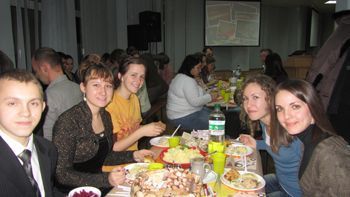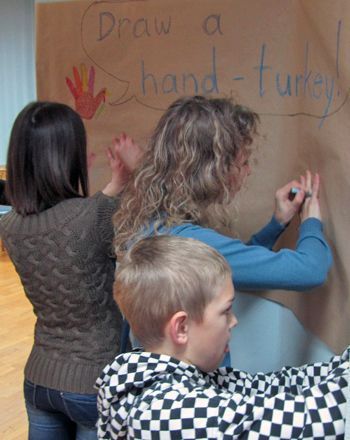
English clubs talk turkey, and more
By Lois Thorpe and Kellie Benge in Kiev, Ukraine — A few days before the fourth Thursday of November, students from several of SEND’s English clubs in Kiev gathered for an American Thanksgiving celebration.
Overall, 45 Ukrainians from seven English clubs attended the outreach event. Some of SEND’s clubs are connected to churches; others are not. In fact, about 15 of the attendees had never set foot inside an evangelical church.
The groups dined on traditional Thanksgiving food, including a 35-pound turkey that had to be pushed home from the market in a baby stroller.

Enjoying the 35-pound bird.
Since Thanksgiving’s roots are connected to freedom of religion, the program focused on the origins of the holiday and the opportunity to give thanks to God for what He has given, which naturally brought in elements of the gospel message.
Speaker Jerry Benge explained that the Pilgrims faced persecution and had to sell everything they owned before they left for North America. They risked their lives, both on the trip and as they settled in their new land. They placed a high value on having a personal relationship with God instead of just following the state religion and traditions.
Jerry ended with a question: "What was so important to the Pilgrims that they would risk their lives for it, and is there anything that important in your life?"
Feedback for the event was very positive. One student responded that the closing words made him stop and evaluate the purpose of his life.

Attendees tried their hand at making turkeys.
Several of the clubs will go on to host Christmas events, where the message of Christ will be clearly shared. Pray that the Lord will prepare the hearts of those who will attend.
Additional Posts




